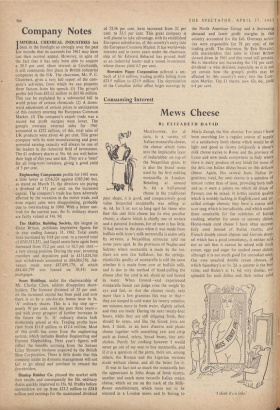Company Notes
MPERIAL CHEMICAL INDUSTRIES has I been in the limelight so strongly over the past few months that its accounts for 1961 may have lost their normal appeal. However, in spite of the fact that it has only been able to acquire a 38.5 per cent. share interest. in Courtaulds, it still commands first place in British industrial companies in the UK. The chairman, Mr. P. C. Chambers, gives a very full report of the com- pany's activities, from which we can pinpoint three factors from his speech. (1) The group's profits fell from £93.62 million to £65.86 million. This can be explained by a substantial fall in world prices of certain chemicals. (2) A down- ward adjustment of certain prices in anticipation of this country entering the European Common Market. (3) The company's export trade was a record but profit margins were lower. The group's overseas external sales for 1961 amounted to £252 million; of this, total sales of UK products were about 46 per cent. This great company with its wide manufacturing and great potential earning capacity will always be one of the leaders in the industrial field of investment. The £1 ordinary shares at 56s. 6d. are well below their high of this year and last. They are a `must' for all long-term investors, giving a good yield of 5 per cent.
Engineering Components profits for 1961 were a little lower at £316,324 against £383,540 but, as stated on March 31, tlle directors are paying . a dividend of 17+ per cent. on the increased capital. The company's trade has been adversely affected by the recession in the motor trade, and even export sales were disappointing, probably due to overstocking in 1960. With a better out- ' look for the current year, the 5s. ordinary shares are fairly valued at 14s. 9d.
The Halifax Building Society, the largest in Great Britain, publishes impressive figures for its year ending January 31, 1962. Total assets have increased by 10.8 per cent. to a record total of £543,513,351, and liquid assets have again been increased from 15.2 per cent. to 16.5 per cent.- a very strong position. During the year, investing members and depositors paid in £131,824,544 and withdrawals amounted to £84,084,756. Ad- vances made were £87,899,179, of which £84,401,799 was loaned on 50,341 new mortgages.
Sears Holdings, under the chairmanship of Mr. Charles Clore, seldom disappoints share- holders. The ;forecast dividend of 25 per cent. on the increased capital has been paid and now there is to be a one-for-six bonus issue in 5s. `A' ordinary shares. This is a big step up- nearly 50 per cent. over the past three years-7:- and with every prospect of further increases in the future the 5s. 'A' ordinary shares look moderately priced at 41s. Trading profits have risen from £11.8 million to £12.4 million. Most of this profit has come from the engineering section, which includes Bentley Engineering and Furness Shipbuilding. Next , year's figures will reflect the benefits accruing from the Saxone Lilley Skinners business acquired by the British Shoe Corporation. There is little doubt that this company under its dynamic management will not fail to go ahead and continue to reward the shareholders.
Dunlop Rubber Co. pleased the market with their results and consequently the 10s. ordinary shares quickly improved to 35s. 9d. Profits before depreciation are up from £23.2 million to £24.8 million and earnings for the maintained dividend
of 15.56 per cent. have increased from 32 per cent. to 33.5 per cent. This great company is well placed to take advantage, with its established European subsidiaries, of this country's entry into the European Common Market. It has world-wide interests and in recent years under the chairman- ship of Sir Edward Beharrel has proved itself as an industrial leader and a sound investment, whose shares yield 4.5 per cent.
Bowaters Paper Corporation suffered a set- back of £1.6 million, trading profits falling from £23.5 million to £21.9 million. The depreciation of the Canadian dollar offset larger earnings by
the North American Group and a decreasing demand and lower profit margins in this country accounted for the fall. Overseas activi- ties, were responsible for 78 per cent. of the trading profit. The chairman, Sir Eric Bowater, tells shareholders that sales in Great Britain slowed down in 1961 and this trend still persists. He is therefore not increasing the 13f per cent. dividend-a wise decision, especially as it is not yet certain how the group's profits may be affected by this country's entry into the Com- mon mon Market. The £1 shares, now 42s. 6d., yield 6.4 per cent.














































 Previous page
Previous page